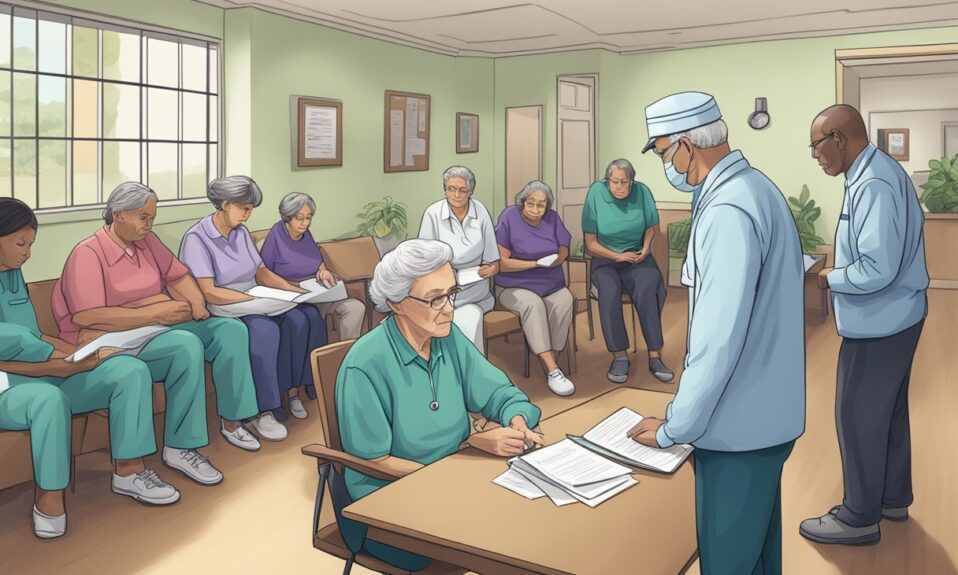Can a Convicted Felon Work in a Nursing Home? If you have a criminal record, you may be wondering if you can work in a nursing home. This is a valid concern, as nursing homes are required to maintain a safe and secure environment for their residents.
In general, nursing homes are subject to strict regulations and guidelines, and they are required to conduct background checks on all employees. So, can a convicted felon work in a nursing home?
The short answer is that it depends. Nursing homes are regulated by both federal and state laws, and the rules can vary depending on where you live. In some states, convicted felons are prohibited from working in nursing homes, while in others, they may be able to work in certain roles. Additionally, the type of felony conviction may also play a role in whether or not you can work in a nursing home.
Legal Considerations for Hiring Felons in Healthcare
When it comes to hiring convicted felons in healthcare, employers must navigate through a complex web of state and federal laws and regulations. Here are some legal considerations to keep in mind when hiring felons in healthcare.
State Regulations and Statutes
State regulations and statutes vary widely when it comes to hiring convicted felons in healthcare. Some states have strict laws that prohibit felons from working in healthcare, while others have more lenient regulations that allow felons to work in certain healthcare positions.
For example, in California, individuals with certain felony convictions are prohibited from working in healthcare positions that involve direct patient care, such as nursing or physical therapy. In contrast, Texas allows convicted felons to work in healthcare as long as they meet certain requirements, such as completing a rehabilitation program.
Employers should consult with their state’s regulatory agency to determine the specific regulations and statutes governing the hiring of convicted felons in healthcare.
Federal Laws and Guidelines
In addition to state regulations, employers must also comply with federal laws and guidelines when hiring convicted felons in healthcare. The Equal Employment Opportunity Commission (EEOC) provides guidance on the use of criminal records in employment decisions, including hiring.
Under the EEOC guidelines, employers must consider the nature and gravity of the offense, the time that has passed since the offense or completion of the sentence, and the nature of the job when making hiring decisions. Employers must also provide applicants with an opportunity to explain their criminal history and consider any evidence of rehabilitation.
Employers should also be aware of the federal laws that prohibit certain individuals with criminal records from working in healthcare positions, such as the Medicare and Medicaid Exclusion statutes.
Employment Eligibility and Restrictions
Background Check Requirements
When applying for a job in a nursing home, you will be required to undergo a background check. This is to ensure that you do not have any disqualifying offenses that would prevent you from working in a healthcare setting. The background check will include a criminal history check, as well as a check of the Nurse Aide Registry to determine if you have any findings of abuse, neglect, or misappropriation of resident property.
Disqualifying Offenses
Certain offenses may disqualify you from working in a nursing home. These offenses include, but are not limited to, violent crimes, sexual offenses, drug offenses, and crimes involving theft or fraud. If you have been convicted of any of these offenses, you may not be eligible for employment in a nursing home.
Rehabilitation and Work Eligibility
If you have a criminal history that includes disqualifying offenses, you may still be eligible for employment in a nursing home if you have completed rehabilitation and can demonstrate that you are a safe and responsible employee. Rehabilitation may include completing a drug or alcohol treatment program, participating in counseling or therapy, and maintaining a clean criminal record for a certain period of time.
It is important to note that each state may have different laws and regulations regarding employment eligibility for convicted felons in nursing homes. It is recommended that you consult with your state’s nursing home regulatory agency for more information.
Roles and Responsibilities in Nursing Homes
Nursing homes provide a range of services to elderly residents, including medical care, socialization, and daily living assistance. As a result, there are a variety of roles and responsibilities within nursing homes that require different levels of education and training.
Direct Care Positions
Direct care positions in nursing homes involve providing hands-on care to residents. These positions typically require certification as a nursing assistant or other healthcare professional. Some examples of direct care positions include:
- Certified Nursing Assistant (CNA)
- Licensed Practical Nurse (LPN)
- Registered Nurse (RN)
Direct care workers are responsible for assisting residents with activities of daily living, such as bathing, dressing, and eating. They also provide basic medical care, such as taking vital signs and administering medication.
READ MORE: Can a Biochemist Become a Nurse? Exploring the Possibilities
Non-Clinical Job Opportunities
Not all positions in nursing homes involve direct care. There are also a variety of non-clinical job opportunities available. Some examples include:
- Administrative staff
- Dietary staff
- Maintenance staff
- Activities staff
Administrative staff are responsible for managing the day-to-day operations of the nursing home, including scheduling, billing, and record-keeping. Dietary staff are responsible for preparing and serving meals to residents. Maintenance staff are responsible for keeping the nursing home clean and in good repair. Activities staff are responsible for planning and leading social activities for residents.
In conclusion, there are a variety of roles and responsibilities within nursing homes that require different levels of education and training. Direct care positions typically require certification as a nursing assistant or other healthcare professional, while non-clinical job opportunities are available in areas such as administration, dietary, maintenance, and activities.
READ MORE HERE









